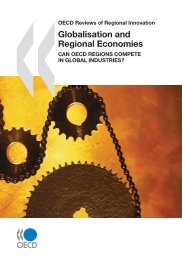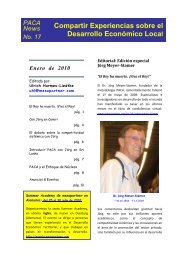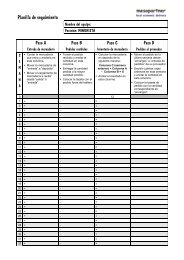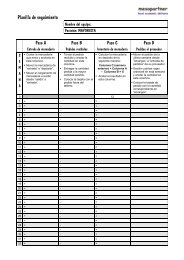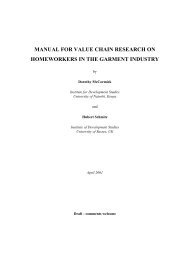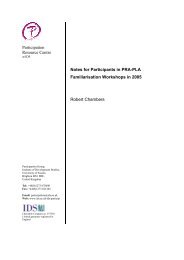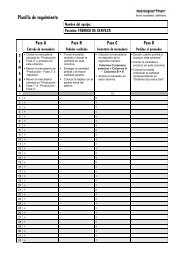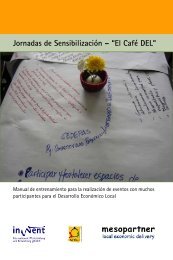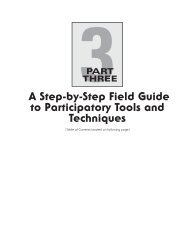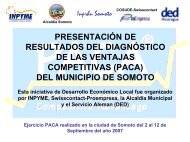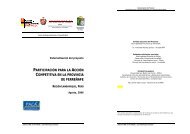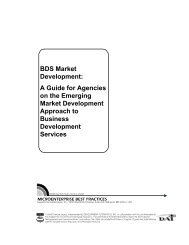OECD Culture and Local Development.pdf - PACA
OECD Culture and Local Development.pdf - PACA
OECD Culture and Local Development.pdf - PACA
You also want an ePaper? Increase the reach of your titles
YUMPU automatically turns print PDFs into web optimized ePapers that Google loves.
CONCLUSION - DESIGNING LOCAL PUBLIC POLICIES<br />
From the local development viewpoint, the real challenge today relates to<br />
idiosyncratic products of what are usually called the art crafts. These products are<br />
vulnerable to copying <strong>and</strong> counterfeiting, <strong>and</strong> they usually have no possibility of<br />
obtaining copyright or a patent, or even a trademark. The question, then, is whether<br />
some minimal form of protection can be given to the geographic origin of cultural products,<br />
in the way agricultural products benefit from designations of origin. Currently, industrial<br />
goods cannot use these territorial labels, <strong>and</strong> must rely on their own trademark.<br />
There is a great deal of controversy over the introduction of such protection,<br />
which is in effect labelling. Debates within the European Commission <strong>and</strong> in the<br />
World Trade Organisation have done little to move the idea forward.<br />
Some countries have therefore adopted another approach, providing for labels<br />
that allow creators to achieve greater visibility, at least, <strong>and</strong> to make use of existing<br />
mechanisms in their country. This is the case in Japan, with the “Living National<br />
Treasure” label, <strong>and</strong> in France, with the “Living Heritage Enterprise” label.<br />
In both cases, the intention is to recognise the specific features of a craft or an<br />
enterprise <strong>and</strong> to highlight the originality of the knowledge <strong>and</strong> skills involved, <strong>and</strong><br />
its economic vulnerability. The need to maintain <strong>and</strong>, one day, to pass on their<br />
knowledge, the problem of finding rare or almost unavailable materials, <strong>and</strong> the<br />
difficulty of making contact with buyers means that these individuals <strong>and</strong> firms must<br />
operate within constraints for which they are not always prepared, <strong>and</strong> which they<br />
may not even recognise. The purpose of the label, then, is to draw attention to these<br />
situations <strong>and</strong> help to sustain the specific art.<br />
Preventing a tragedy of artistic property privatisation<br />
In contrast to the risk discussed above, there is today the threat that intellectual<br />
property rights will be extended well beyond their appropriate application. Recognising<br />
property in the content <strong>and</strong> not only in the expression (which is generally accepted)<br />
will constrain the use of ideas or allusions that are already public <strong>and</strong> will prevent<br />
some creators or innovators from defining new products. This represents a kind of<br />
entry barrier to the market in ideas, a barrier that is particularly objectionable if the<br />
first person to put an idea to use is not necessarily its inventor. At the local level this<br />
poses some paradoxes: the originators of a musical or decorative theme may suddenly<br />
find that their own “work” has been protected by someone else, <strong>and</strong> that they now<br />
have to pay to use it. <strong>Local</strong> governments would surely do well to conduct an inventory<br />
<strong>and</strong> take steps themselves to protect the intellectual resources in their territory.<br />
<strong>Local</strong> policies for promoting creativity<br />
<strong>Culture</strong> <strong>and</strong> creativity districts can appear in many contexts, but they can never<br />
be artificial or automatic. Recognising that such a district cannot be willed into<br />
162 CULTURE AND LOCAL DEVELOPMENT - ISBN 92-64-00990-6 - © <strong>OECD</strong> 2005



